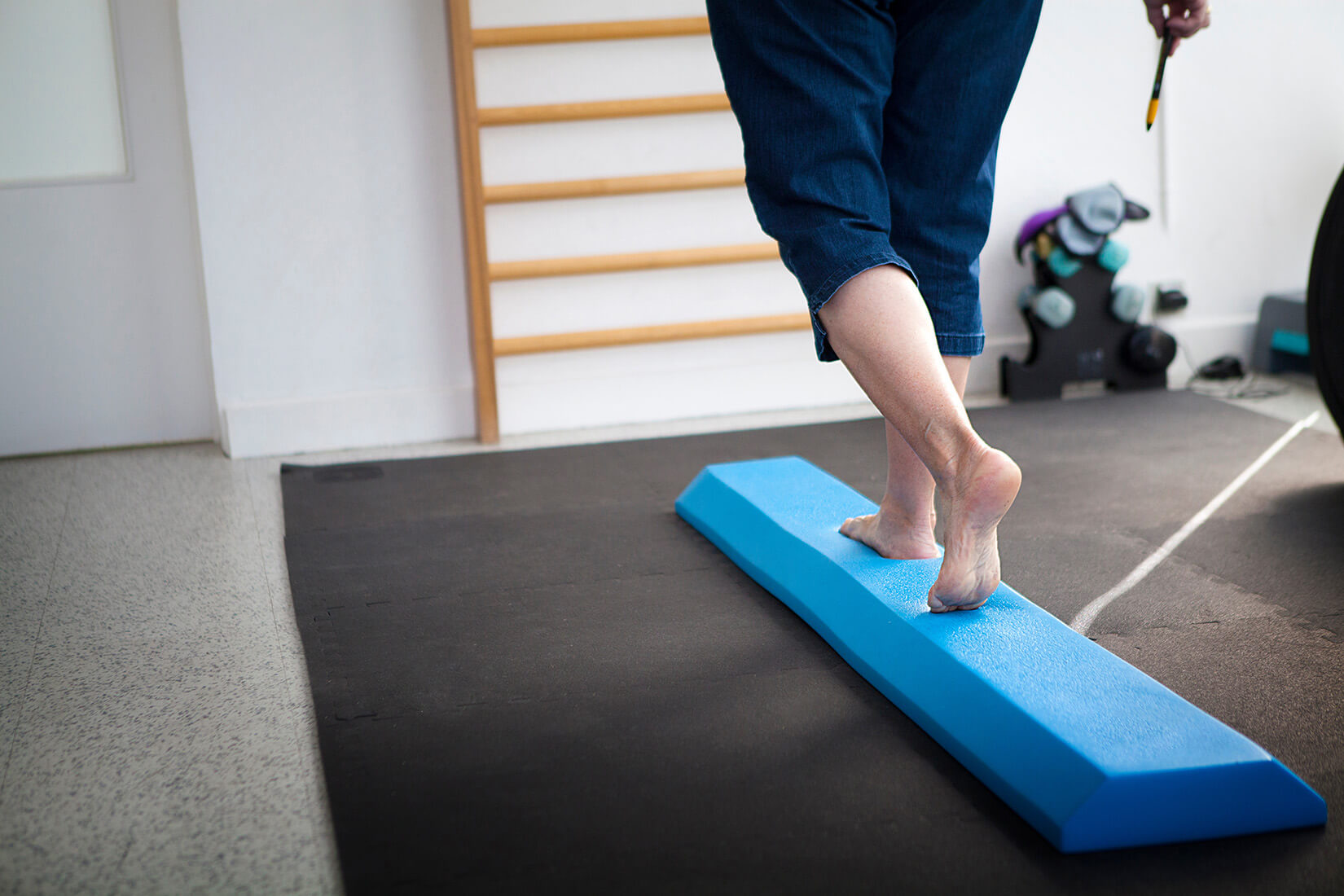Did you know a Denver physical therapist can help with dizziness? Each year, over 10 million patients visit their doctor due to dizziness concerns. While more common for older patients, dizziness can affect people of any age and may be a symptom of serious health problems. These health issues may include an inner ear disorder, vertigo, a side effect of medication, or a head or neck injury.
To help patients combat the effects of dizziness, physical therapists have developed a treatment plan known as vestibular rehabilitation. This type of care focuses on helping patients recover from dizziness through a series of specially designed exercises and stretches. Over time, vestibular rehab therapy can help patients improve their balance, posture, and can significantly decrease (or completely eliminate) dizziness problems. In this blog, we’re taking a closer look at how an experienced Denver physical therapist can help you recover from dizziness issues through vestibular rehabilitation.
At Total Physical Therapy, we understand how every path to recovery is unique. That’s why we develop personalized treatment plans based on your specific healthcare needs and goals. We offer close, one-on-one access with Denver’s best physical therapists to speed up your recovery and improve your overall fitness. If you’re experiencing dizziness, limited joint mobility, chronic pain, or any musculoskeletal injury, our evidence-based physical therapy can help.
With open and consistent communication, advanced therapy techniques, and an entire physical therapy staff dedicated to the unique path of your recovery, Total PT can get you back to the life you love.
What is Vestibular Rehabilitation?
First things first, what exactly is this type of treatment? According to the Cleveland Clinic, vestibular rehabilitation is an “exercise-based program, designed by a trained vestibular physical therapist, to improve balance and reduce problems related to dizziness.” This sensation of dizziness, which can include feeling unsteady, lightheaded, spinning, swaying, tilting, or even a feeling of passing out, can be caused by a variety of health problems.
In some cases, dizziness may be a symptom of a more serious underlying health issue. If you’re experiencing chronic dizziness, schedule an appointment with your primary care physician. They’ll be able to diagnose the cause of your dizziness and help you identify the most effective treatment program, which may include vestibular rehabilitation.
What Conditions Can Vestibular Rehab Treat?
Many different types of patients can benefit from receiving vestibular rehabilitation. As a safe, holistic, and non-invasive approach to care, vestibular rehab can effectively treat a range of health problems. For some patients, vestibular rehab is recommended in tandem with additional treatments to help patients find long-lasting relief from dizziness and other symptoms.
If you’re experiencing one or more of the following health problems, vestibular rehabilitation could be an effective treatment for you:
· Vertigo.
· Chronic dizziness.
· Imbalance issues.
· Meniere’s disease.
· Migraines or headaches.
· Serious neck or head injuries.
· Benign paroxysmal positional vertigo (BPPV).
· Frequent falls (often associated with older patients).
· Neck stiffness or tightness.
· Dizziness in association with blurred vision.
· Recovering from a stroke or brain injury.
Top Benefits of Vestibular Rehabilitation
A successful vestibular rehabilitation program can offer patients a range of health benefits. By following your program with the assistance of an experienced physical therapist, patients may expect the following health benefits:
· Decreased dizziness.
· Decreased risk of falling.
· Improved balance.
· Restored mobility and overall functioning.
· Improved neck strength and mobility.
· Better vision and stabilized gaze.
· Increased overall body strength.
· Confidence to maintain and enjoy an active lifestyle.
How Does Vestibular Rehab Work?
If you’ve already been involved with physical therapy in Denver, you may already know how this treatment works. Vestibular rehabilitation consists of a series of exercises and stretches designed to address health issues related to dizziness and imbalance. At the beginning, patients are carefully guided by their physical therapist on how to properly perform this exercises. Most patients find that the exercises themselves are not difficult to learn; however, consistency is key to a long-lasting and successful recovery here.
While patients work closely with their physical therapist, they may also be asked to perform their exercises and stretches at home. For many patients, it will be recommended that they perform their program 2-3 times each day, which for some, can seem difficult with an already busy schedule. However, it’s important for patients to keep up with their vestibular rehab program and find a way to remain consistent with their exercises. The overall effectiveness of the entire treatment plan depends on this.
For some patients, the early stages of the program might feel like you’re agitating and even increasing your symptoms. While this may feel odd at first, it’s generally a sign that you’re actually on the right track as you are stimulating the vestibular system. But with time and endurance, patients tend to note a decrease in symptoms as they continue with their exercises. Over time, many patients even experience complete relief from any previous symptoms of dizziness or imbalance.
While each program is, of course, unique to the patient, a vestibular rehabilitation program may include a variety of different exercises and stretches, including:
· Posture training.
· Stretching and strengthening exercises.
· Vision stability training.
· Balance retraining exercises.
· Walking exercises.
· Neck mobility exercises and stretches.
· Ergonomic training (ideal for anyone who has health issues as a result of their workplace environment. Vestibular rehab can help them find comfortable ways to improve their posture and decrease discomfort).
How Long Does Vestibular Rehabilitation Take?
The duration of a successful vestibular rehab program comes down to the individual needs of the patient. This will include important factors such as their specific diagnosis, their current fitness level, and medical history. Generally, however, patients for vestibular rehabilitation will enter into a treatment program where they visit a physical therapist 1 to 2 times a week for 6 to 8 weeks. However, some patients may experience the benefits of a program in as short a time as just a few sessions. Speak with your physical therapist to learn more about the expected duration for your program.
Conclusion – What is Vestibular Rehabilitation?
If you’re experiencing chronic dizziness, know that you don’t have to suffer alone. Call your doctor or nearby physical therapy office to see if a vestibular rehabilitation program could be right for you. Through a combination of specialized exercises and stretches, vestibular rehab has helped countless patients combat dizziness spells and also improve their posture, balance, and overall wellness.
Denver Total PT is your premier physical therapy office. We serve patients throughout the Denver metro area and offer a unique, personalized approach to treatment. We offer unmatched one-on-one access to Denver’s top physical therapists so that you can recover faster from your injuries and achieve long-lasting results.
If you’ve been in a car accident, recovering from a sports-related injury, or require post-surgical care, our experienced Denver physical therapy staff is here to help. With evidence-based treatments, we can help provide quick pain relief, improve your mobility, and even help you prevent future injuries. With our unique, holistic approach to care, our physical therapy office provides personalized care for your total health.
Contact us today or give us a call us at (303) 758-5060 to schedule an appointment for your initial consultation. At Total Physical Therapy, we can help to get you back to the active, healthy lifestyle that you love.




